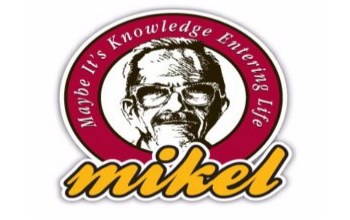How The Coffee Industry Has Been Engaging With The Circular Economy
Last month, Jennifer Ferreira, a researcher in the Centre for Business in Society at Coventry University and Opinion Leader at CoffeeBI, gave a guest lecture at Leiden University in the Netherlands to talk about the coffee shop industry, recycling and the circular economy.
The lecture focused on exploring the implications of the rapid growth of the coffee shop industry for waste production and management, and specially on how different stakeholders in the industry have been engaging with the circular economy.
This is an extract from her article:
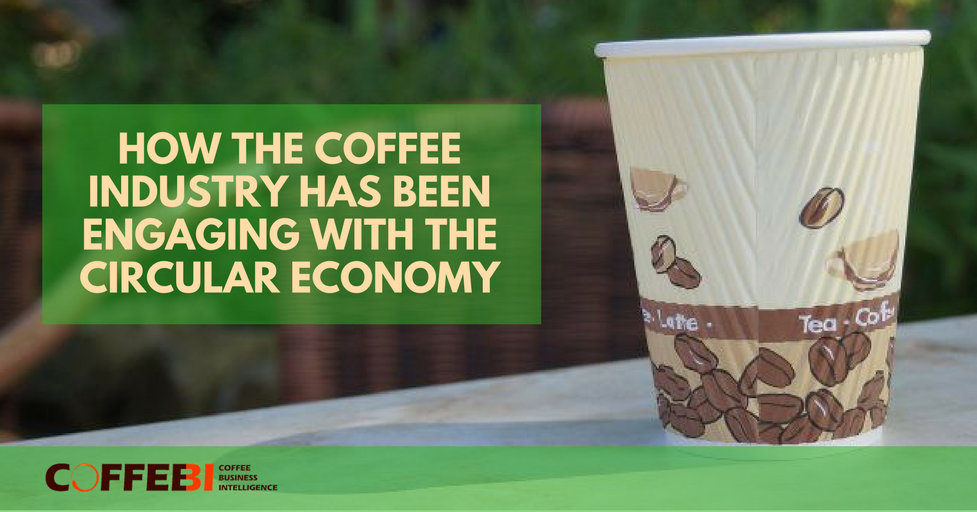
“There was a discussion on the amount of disposable coffee cups that end up in landfills and attempts to try and reduce them, from the Square Mile Challenge in London and the proposed ‘latte levy’ in the UK, as well as efforts from coffee shops to encourage the use of reusable cups, to the Freiburg Cup and re-cup schemes that have been in operation in Germany.
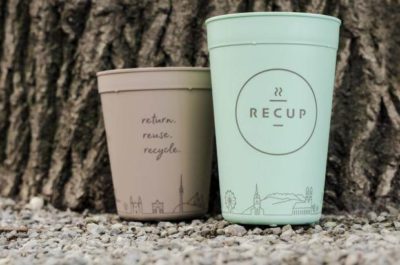 Freiburg Cup: introduced in 2016, a scheme in the city of Freiburg where for a deposit of €1 consumers can get a reusable coffee cup (and usually a discount on their coffee) which can then be returned to a number of participating stores for cleaning and reuse (and the deposit is returned). Participating stores have an identifying sticker in the window.
Freiburg Cup: introduced in 2016, a scheme in the city of Freiburg where for a deposit of €1 consumers can get a reusable coffee cup (and usually a discount on their coffee) which can then be returned to a number of participating stores for cleaning and reuse (and the deposit is returned). Participating stores have an identifying sticker in the window.
Re-cup: a similar coffee cup sharing scheme which has been adopted in a number of cities in Germany including Munich, Wasserburg, Berlin, Oldenburg, Ludwigsburg, Rosenheim, and Cologne. For a €1 deposit you get a cup that is made of 10% recyclable plastic, and is available in different sizes, which can be returned to participating stores in any of these cities. Again there is usually a discount on the coffee purchased too. There’s also an app which shows you which cafes, bakeries and stores are taking part.
Several examples of how coffee grounds have been reused were also discussed:
Various free coffee ground schemeswhich provide consumers with free coffee grounds and information about how to use them in the garden etc.
Businesses like Grocycle in the UK, and Upcycle in France, who use the grounds for growing mushrooms.
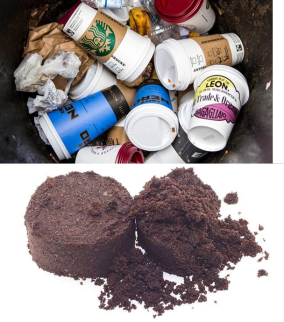 Grocycle has been collecting coffee grounds from coffee shops to grow mushrooms in Plymouth since 2011. They have since expanded their operations to a mushroom farm which supplies mushrooms to restaurants and businesses as well as educational activities to help others start their own mushroom farm. They also have home growing packs too, which are good fun, and produce very tasty mushrooms. Their website suggests that since 2011 they have recycled 62,337 kg of coffee, helped 29,932 people grow mushrooms at home and trained 862 people in mushroom cultivation using coffee grounds.
Grocycle has been collecting coffee grounds from coffee shops to grow mushrooms in Plymouth since 2011. They have since expanded their operations to a mushroom farm which supplies mushrooms to restaurants and businesses as well as educational activities to help others start their own mushroom farm. They also have home growing packs too, which are good fun, and produce very tasty mushrooms. Their website suggests that since 2011 they have recycled 62,337 kg of coffee, helped 29,932 people grow mushrooms at home and trained 862 people in mushroom cultivation using coffee grounds.
Upcycle, based in Paris, collects coffee grounds from automatic coffee machines to grow oyster mushrooms. Left over material is given to local farmers.
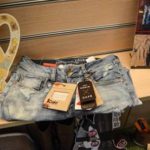 Businesses who use coffee grounds to make clothing (and other products) in Taiwan. Singtex has developed a process for turning coffee waste and plastic bottles into fabric, as well as extracting coffee oil from the grounds which can then be used in cosmetic and soaps by other businesses.
Businesses who use coffee grounds to make clothing (and other products) in Taiwan. Singtex has developed a process for turning coffee waste and plastic bottles into fabric, as well as extracting coffee oil from the grounds which can then be used in cosmetic and soaps by other businesses.
Innovations in design where products have been made that include used coffee grounds, from the Kaffeformcoffee cup, jewellery designed by Rosalie McMillan to furniture made by Re-Worked. Of course it’s not only the grounds that are being reused – some businesses are even finding ways to reuse the coffee husks, for example Huskee Cup.
Innovations in energy production. In the UK, the company Bio-bean, established in 2014, pioneered the process of recycling waste coffee grounds into biofuels and biochemicals. In terms of energy there are also businesses who are seeking to reduce energy consumption. The example of Costa Coffee in the UK was discussed, exploring their Eco-pod café concept that was designed to be the UK’s first ‘zero energy’ coffee shop, as well as their new roastery which had set itself zero waste targets.
The lecture tried to show how there are various innovations in different areas of the coffee shop supply chain where efforts are being made to try and reduce consumption, as well as reduce the production of waste. Moving to a more circular economy model is one way businesses have been doing this, and the example of the Danish business Kaffe Bueno was mentioned, which is a start-up based in Copenhagen. They are a coffee trader and roaster who supply coffee from organic micro-lots in Colombia to various places in Copenhagen, but then also recycle the used coffee grounds to produce natural cosmetics – they aim to build Scandinavia’s first bio-refinery in 2018 too.
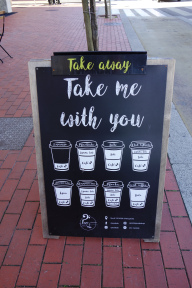
There were also discussions of attempts to establish zero-waste coffee shops, such as Silo in Melbourne, but also the difficulties in trying to run this sort of business, and barriers that may be faced when trying to engage in circular economy business practices.
The importance of different national café and coffee cultures were highlighted. Different café cultures have implications for the amount of waste produced. Rising prevalence of takeaway coffee cup culture in countries with increasing numbers of coffee shops means that there are likely to be growing issues around the number of disposable cups in different markets. There are issues around the consumption rates of coffee, and how the coffee production side of the industry can keep up too, as well as broader issues around energy consumption and waste management in all areas of the coffee shop supply chain.”

